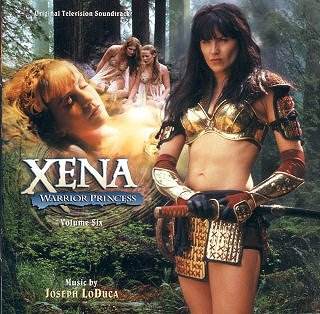Joseph LoDUCA
Xena Warrior Princess (Volume 6) Original Television Soundtrack
 VARÈSE SARABANDE
VSD-6 255 2CDs [142:62]
VARÈSE SARABANDE
VSD-6 255 2CDs [142:62]

For those who don't know, and given that Xena:
Warrior Princess only plays on cable, satellite and the so-called
national network, Channel 5, in the UK, there must be plenty,
the show is a long running action adventure spun off from the
programme it eclipsed, Hercules: The Legendary Journeys.
Centred around the life of a once bad, now reformed female warrior
princess (obviously!) in ancient Greece, the show roams through
time and space, sometimes taking itself fairly seriously, other
times tongue-firmly-in-cheek. Recently finished, Xena ran
for six years and inspired a host of other adventure shows, developed
a cult following and stirred some controversy over a lesbian storyline
which led to the most famous kiss on US TV since Kirk and Uhura.
A still taken from about a second before that event is to be found
on the back of the accompanying booklet. What the booklet doesn't
reveal is any information about the music. There are six inner
pages of colour illustrations and some brief comments from Lucy
Lawless (who plays Xena) and her husband and the show's executive
producer Rob Tapert on how great composer Joseph LoDuca is at
"saving our show" (LoDuca scored every episode, as Mark Snow does
The X-Files and Christopher Franke did Babylon 5).
But there is nothing on the specific cues. This is an oversight
given there is a lot of music here from a lot of different sources;
there are at least 134 episodes of Xena, and even the most
die-hard fan is going to have problems placing some of this material.
This is two disc anthology, opening with an approximately
20 minute set of eight cues from the episode "Fallen Angel". Then
there are four cues totalling over 15 minutes from "Ides of
March" followed by an almost seven minute track from "God
Fearing Child". "The Ring Trilogy" has eight cues totalling
18 minutes. The first disc ends with two "Dance Cues" totalling
about seven minutes. There is no indication which episode they
come from. It is the second disc where matters get really confusing.
After eight cues running around 25 minutes from "Friends in
Need" there are eight bonus cues. Are these from "Friends
in Need"? Or are they from various episodes? Why are these
cues "Bonus"? Were they never used, or are they alternative versions?
Finally, and the most confusing section of all, comes 14 tracks
headed "Special Requests." These run about 23 minutes. It doesn't
take much to work out this is material requested by fans of the
show. But again, which episodes do the tracks come from? What
is happening while this music plays?
The music is very diverse, LoDuca being the kind
of composer who can turn his hand to virtually any style. Everything
is here. Action, adventure, suspense, battle music, romance, atmospheric
soundscapes. "Fallen Angel" makes much use of digital choirs
(the composer thanks "Symphony of Voices") and often has an epic,
portentous feel. The orchestrations are surprisingly complex given
the rushed nature of American television production; this is superior
TV scoring. From "Battling Archangels" "Ides of March"
finds "Calisto in Hell" complete with 'voices of the dammed' samples.
This is taut, disturbing writing, and LoDuca proves himself apt
at sustaining tension, his powerful use of brass and percussion
having a decidedly Herrmannesque quality. Unusually for television
there are several quite lengthy cues, "Way of Pain" maintaining
interest for over six minutes.
"End of Days" is an almost seven minute cue from
"God Fearing Child" and is a piece of bold, intense dramatic scoring
closer to what we expect from John Williams or Jerry Goldsmith
in adventure-thriller mode than weekly TV. The cue from "The
Ring Trilogy" mercifully do not pastiche Wagner but offer
heroics and action, and in the example of "Rhine Maidens" a colourfully
descriptive piece of scene-setting. Long awaited, "The Kiss" provides
underscore which does not detract attention from what was happening
on screen. The following two dance cues have a decided Dead Can
Dance goes Turkish feel. The latter, "You Will Dance" would not
have been out of place in Gladiator (2000).
"Friends in Need" is largely an exercise in creating
Japanese flavoured atmospheric soundscapes. LoDuca thanks Heart
of Asia samples and humorously entitles one cue "Snow Falling
on Cedars". The set builds to the almost nine minute epic, "Xena
vs. Yodishi", which while powerful has an element of 'mickey mousing'
the screen action.
The "Bonus Cues" are a mixed back containing
a great variety of music, while the "Special Requests" range everywhere
from silly songs - "Joxer the Mighty" performed by Ted Raimi -
presumably deliberately calls to mind Monty Python's "Lumberjack
Song", to country music pastiches, "Chasin' Chickens". Appropriately
it all ends with the rousing "Main Title", which somehow manages
to convey the spirit of all-or-nothing, do-or-die adventure in
82 seconds flat.
In a very bad month for film music this television
album is a real highlight. A well-crafted mixture of orchestral
and electronic writing, a healthy dash of ethnic instruments,
a wide range of styles and a helping of humour adding-up to a
refreshing, good value anthology. It's a shame about those none-existent
booklet notes, and now Xena is done its about time someone
gave Joseph LoDuca a big movie to score.
Gary S. Dalkin

